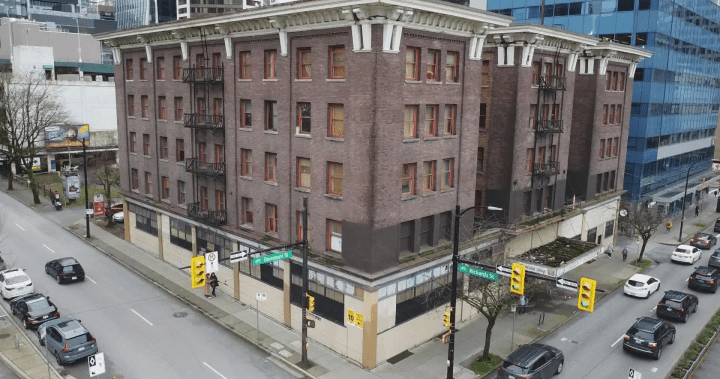The Dunsmuir Hotel, a 115-year-old Vancouver landmark, faces imminent demolition after the city council declared it a public safety hazard. The building, vacant since 2013 and suffering from a leaky roof for over a decade, has deteriorated to the point of potential catastrophic collapse, prompting the council’s unanimous decision. Holborn Properties, the owner of the structure, has been given a 21-day deadline to carry out the demolition at their expense. The council has also mandated the preservation of salvageable heritage features for potential reuse in any future development on the site. While the Dunsmuir Hotel is on Vancouver’s Heritage Registry, it lacks the legal protection afforded by heritage designation laws, leaving it vulnerable to its current fate.
The situation has sparked accusations of “demolition by neglect” against Holborn Properties. Critics, including retired architect and real estate consultant Michael Geller and SFU city program director Andy Yan, argue that the company allowed the building to fall into disrepair, possibly as a calculated strategy to clear the site for redevelopment. Councilor Sarah Kirby-Yung questioned the sudden urgency Holborn displayed in demolishing the building, contrasting it with their apparent lack of motivation to maintain it. Holborn, however, denies these allegations, claiming they have submitted three redevelopment proposals over the past decade, all aimed at revitalizing the property, though none were successful. They also maintain that they have consistently worked with authorities to ensure the vacant building met fire and life safety codes.
The demolition of the Dunsmuir Hotel raises significant concerns about the loss of affordable housing, as the building formerly served as a single-room occupancy (SRO) hotel. Housing advocate and former Vancouver councillor Jean Swanson calls for penalties against Holborn, advocating for the city to levy fines of up to $300,000 per unit under the city’s SRO bylaw, which could amount to $50 million in replacement fees for the 167 lost rooms. Holborn, however, disputes the applicability of these fees, claiming the Dunsmuir House’s SRO function was replaced by Belkin House in 2004 under the previous owner, the Salvation Army, and further noting the city reclassified the building from residential to commercial in 2021.
The future of the site remains uncertain. Geller questions why Holborn should be permitted to rezone the property after demolition and advocates for the city to hold firm in negotiations. While current zoning allows for an office building, Holborn indicates a reluctance to pursue this given the current surplus of office space in downtown Vancouver. Instead, they reiterate their commitment to a project that benefits the community, referencing their past proposals that included housing. This, however, necessitates a rezoning application, providing the city with leverage to ensure community benefits and potentially recoup some losses associated with the demolition.
The Dunsmuir Hotel saga underscores the tension between development pressures and heritage preservation in Vancouver. Critics argue that the city’s existing mechanisms are insufficient to protect vulnerable heritage buildings, allowing owners to exploit loopholes and neglect properties to the point of demolition, paving the way for more profitable developments. This case also highlights the ongoing challenge of balancing the need for new development with the preservation of affordable housing, particularly in a city grappling with a housing crisis. The loss of the Dunsmuir Hotel’s SRO units, regardless of whether they were actively used as such in recent years, represents a further erosion of this crucial housing stock.
The city council has directed staff to explore legal options against Holborn for the apparent neglect of the Dunsmuir Hotel and the consequential loss of heritage. They have also been tasked with investigating avenues to seek compensation from Holborn as part of any future rezoning applications for the site. This sets the stage for a potentially protracted negotiation between the city and the developer, with the outcome significantly impacting the future of this prominent downtown location. The Dunsmuir Hotel’s demolition serves as a cautionary tale about the fragility of unprotected heritage structures and the potential for demolition by neglect, underscoring the need for stronger safeguards and stricter enforcement to prevent similar losses in the future.

